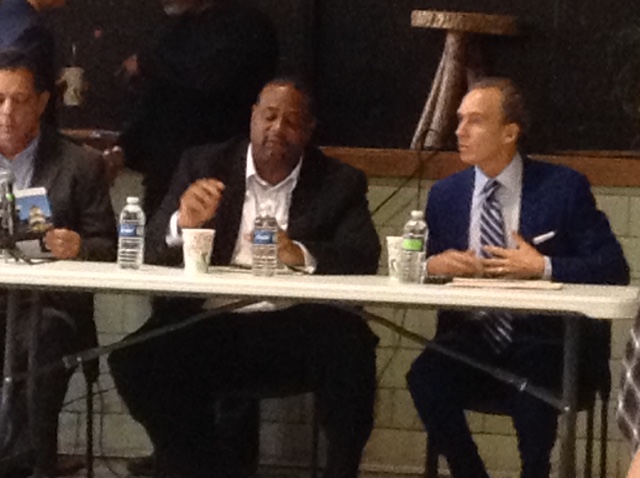
The grandmother shifted nervously in her chair, looking nervously over her shoulder for her grandson.
He was a few minutes late to arrive to the Criminal Justice Reform Roundtable Policy Discussion hosted by State Representative Ed Gainey at the Community Empowerment Association in Homewood, which featured Pennsylvania Lieutenant Governor Mike Stack, State Senator Jay Costa and representatives from the Allegheny County District Attorney’s Office and the Pennsylvania Board of Pardons, which Stack also chairs.
The conversation about pardons, criminal record expungements, and potential changes in laws about drug possession is significant to many in the community because, like the young man, felony convictions for possession of small amounts of marijuana can hamper one’s return to society by excluding the rehabilitated from attaining aid for higher education, business loans, public housing and other programs which would allow them to become more financially viable. Nearly 8 percent of African-Americans of voting age are denied the right to vote due to a felony conviction, although Pennsylvania no longer has such a restriction.
High rates of incarceration for minor possession, particularly in minority communities is a major contributor to higher rates of poverty, says Rashad Byrdsong, the Founder and Chief Executive Officer of the CEA.
“The drug war has driven incarceration,” Byrdsong says. “Most of the people here have been impacted in some way by incarceration. A lot of these people are mothers, are girlfriends, are uncles, nieces, nephews, who want to see their loved ones at home. In the ‘War on Drugs,’ this was one of the targeted communities, so a lot of young folks from this community were incarcerated.”
“Sixteen percent of all people incarcerated are in for drug violations,” Byrdsong says. “Over 50 percent of those, for possession alone. There are 2.7 million children living in homes with one or both parents incarcerated, with two-thirds of them incarcerated for non-violent offenses, including marijuana possession.”
One in 9 children with an incarcerated parent are black, compared to 1 in 28 Latino and 1 in 57 white children with incarcerated parents. Disparities in “pre-trial disposition” can also have greater impact on black families, and has resulted in nearly two-thirds of those in local jails being those awaiting trial.
Rashad says it is important to establish a “broad-based coalition of common folks to work together for criminal justice reform legislation: To stay abreast of legislation; to work toward decriminalization of small amounts of drugs to remove the primary cause of arrest and incarceration of primarily people of color; to provide drug abuse training to work toward the prevention of violent crimes; an the elimination of policies that create disproportionate arrests and incarceration rates by changing police practices and by lowering harsh mandatory minimum sentencing.”
“We should also clear the records of formerly incarcerated citizens who have served their sentences ad behaved as model citizens for a specific period of time,” Byrdsong says.
“I have talked many times about the ridiculous way we do justice here in Pennsylvania,” Stack says. “The system is grossly unequal, and we are squandering the greatest resource we have here, that is, our young people. And, some people who are not so young, but have great things to offer.”
“Instead of teaching people how to get back on the right track, and contribute to society, we warehouse them in prison,” Stack says. “Then, after warehousing them in prison, are we giving them a chance to succeed when they come out? Absolutely not. Continuing to call prison ‘rehabilitation’ is laughable, and hardly a person gets a chance at rehabilitation.”
“We know there is an epidemic of drug use in Pennsylvania, and we know it is a disease,” Stack says. “We have been saying it is a disease for years, but have we been treating it like that? No, we have not. We have to get to a point where treatment is easily available, instead of saying ‘We’ll put them in prison for a long time.’”
As Chairman of the Board of Pardons, Stack says he often hears people talk about getting a second chance, or even a third.
“But how do you have a second chance with a criminal record,” he asks. “Who’s going to give you that chance? For the most part [that record] says there is no way you are going to get a job that is a sustainable income to support your family.”
Stack says “we are supposed to be the land of second chances, and what better way to give people a second chance or, by the way, a third chance if necessary? People make mistakes.”
Stack says that since taking office, he has prioritized the granting of pardons far more than the previous administration, eliminating red tape and modernizing the process to reduce backlogs of applicants so that hearings can be attained in two years as opposed to the previous wait of five or more years.
“In this day and age when we have so much technology available, they are doing it 1950s style,” Stack says, noting that a lack of computerization he is working to remedy could itself streamline the process to further reduce the “still unacceptable” two-year wait for a hearing.
“People are overworked, there is not enough staff,” Stack says, but notes that he is working with Gainey, Costa and others to prioritize the Board of Pardons so it is more accessible and more efficient.
“We know folks who have had criminal records for a long time,” Stack says. “They have been told the answer is ‘no’ to employment and other opportunities. So we are expediting the process. We need more staff. We have a budget crisis, and everyone is saying ‘we need more funding, but folks, we are trying to do a little thing called ‘Justice.’”
“The effect of the justice system is often racial, and racist, where African-American folks and people of color are given much heavier sentences than other folks,” Stack says. “I feel that in the next few months, we are going to hire some new employees, implement some new technology, and we are going to hear more cases and really let folks have a chance at a pardon and a chance to succeed.”
A merger of the Corrections Department and the Board of Probation and Parole proposed by Pennsylvania Governor Tom Wolf will also eliminate duplicative efforts and help to streamline the process, Stack says.
“In addition to granting more people pardons and giving them a chance at a better life,” Stack says, “the other things we are talking about are really providing job training and giving people a chance. The other thing that will give people a chance is treatment.”
“When I hear people say ‘everybody agrees we need treatment,’ and we do, across the board, what I continue to hear is ‘we don’t have enough beds,’ ‘we don’t have enough facilities,’ ‘we don’t have enough resources,’” Stack says. “But we can find $30 million to build a new prison. Let’s build less prisons, and make more treatment available.”
“We need to make sure that justice is efficient, so that we can get all the things we need to the community,” Stack says. “But we aren’t going to get it done all by ourselves. We all have to do it together.”
“We need to begin to have a conversation about working groups, so that we are well-positioned to have that dialogue about where changes need to be made,” Costa says. “It is not the first time that the Lieutenant Governor has talked about these changes. We need to walk together, shoulder-to-shoulder and arm in arm to make sure these changes get made.”
“We have been successful in getting a pretty significant issue underway in Pennsylvania which says that after five years, if you have a clean record, you can go back and have your record expunged,” Costa says. “We are now working on a second piece of legislation that would address that, after 10 years, folks would have limited access to your records so that folks who go out and try to find a job wouldn’t have to disclose that they had some type of ‘situation’ that today is beside the point. That’s a first step.”
“If you have done what you need to do, whether it’s incarceration or probation or whatever, and 15 years later find out it can still harm you, that’s a barrier, and we have to work to remove barriers,” Costa says. “Expediting the process of expungement is extremely important.”
“Another thing which has elevated itself to the forefront of conversation throughout the Commonwealth is the issue of opiods,” Costa says. “At the end of the day, a lot of crime stems from the use of opiods, and the folks who manufacture opiods, and the role that they play in terms of figuring out whether someone has a successful outcome in terms of treatment. So, in my view, what we have is an industry which is pushing and pushing opiods, narcotics folks start to take for whatever they need and then become addicted to, which leads to other types of drug [abuse] and leads to folks being incarcerated, or to dying in the streets.”
“My view is that we need to look to the pharmaceutical community to be part of the solution, because they are part of the problem as it relates to getting folks hooked on some of these things,” Costa says. “We want them to be part of the solution. Just as we impose an ‘impact fee’ on Marcellus shale drilling, we are asking that a 10-percent assessment be applied to the sale of all narcotics, most importantly without the authority or ability to pass it on to the consumer.”
“What are we going to do with those dollars,” Costa asks. “One, we are going to expand the amount of treatment. We know we have to have that treatment take place in our communities, not necessarily in facilities, but we need to have community-based treatment.”
“The second part of that is that we have to make sure we have people to man those treatment centers,” Costa says. “If we are to expand that capacity, we have to make sure we have people trained to be a part of that process,” including working with the Pennsylvania Higher Education Assistance Agency (PHEAA) to provide grants to those willing to train to work with addiction treatment and counseling “to make it easier for them to follow that path.”
Costa also says that the short-term rehabilitation stays commonly offered are insufficient as well.
“The 25- or 30-day stay is not going to kick someone’s habit,” Costa says. “It needs to be four, five, six months. And we need to make sure that the insurance companies are in this conversation. Insurance companies go to great lengths to mask the coverage that is there, and make sure you don’t get the opportunity to get the treatment you are entitled to. That’s wrong, and we are working with the advocates in Harrisburg to make sure an insurance company does not try to avoid or evade providing the level of treatment that is necessary.”
“We [also] need to let people know the harsh realities of addiction, so we bringing together the Department of Education, Human Services and Drug and Alcohol and ask them to develop a program that provides some type of curriculum, or injects into the curriculum, information along those lines that we think is essential,” Costa says. “It can’t wait until the Junior or Senior year in high school — it’s got to start in middle school.”
Costa also feels that requiring e-prescriptions will prevent the theft of prescription pads, often misused to forge prescriptions for narcotics which otherwise would be unavailable.
Gainey, who recently held the first meeting of the House committee he created to address opioid addictions, “HOPE,” says “incarceration is a step they want to use to rehabilitate, but incarceration only creates more re-entry, more addiction, more problems.”
“If we can’t provide the people of Pennsylvania HOPE, what can we do?”
“When you talk about the ‘War on Drugs,’ let’s talk about how many African-American fathers are missing from the home, for small amounts of marijuana, and how we are three generations removed from fathers in the home,” Gainey says. “If you can’t stop the drug trade, you will never stop the drug war. That’s why I introduced a bill so that if you are caught with small amounts of marijuana — if he is caught with a small amount of marijuana, he is a user, not a dealer. What does he need to be in jail for, or have a felony on his record? Give him a fine, and let him move forward in life.”
“We need laws that improve humanity, not remove us from humanity,” Gainey says. “I believe in reform. If you give someone in trouble a second chance, those who followed them into [trouble] can follow them out.”
Gainey also explains a bill that would, after maintaining a clean record for 10 years, “and, 10 years, that’s a long time,” he says. “If you are clean for 10 years after a non-violent felony, you can have your record set right. What does it take if you have been good for 10 years, and you have already served time — think of the message we are sending to our children, that ‘Daddy messed up,’ and can’t make it right?”
“I stood on the House floor, and said ‘if a family member or a friend you have has not been impacted by drugs, please stand up,’” Gainey says. “Not one person stood up. Over 200 members in the House of Representatives, and every single one of them has had someone impacted by drugs. We should be leading by example. If unions have to be drug tested, if those on welfare have to be drug tested, to be a savior of taxpayer dollars, we should be too.”
“If we were to take a drug test in the House of Representatives, in the Senate, I guarantee we would legislate differently when it comes to drugs,” Gainey says. “If you get busted the first time, we won’t embarrass you, go get help. But if you get busted a second time, it’s at the taxpayer’s expense. We are going to have to make it public unless you have a doctor’s note.”
“We have to make sure that we are doing more to help each other than to separate us,” Gainey says. “I don’t care if you are black, white, Asian, man, woman, or anything else. The greatest power we have is diversity, and we can never move forward unless we move together. The information provided at the roundtable could not be more important to the community, Gainey says.
“It’s something we are in desperate need of. Change doesn’t happen overnight. And it doesn’t happen unless we have you with us. We are fighting people who want to be tough on crime instead of good for humanity,” Gainey says. “I think sometimes that we have been in the struggle so long we don’t want to fight; we just want to point the finger. Pointing a finger never helped anybody. We don’t have to agree all the time, but we have to come together to empower our interests to get things better for our community. If we do all these things together, we are in business.”
“There couldn’t be a more important thing to do than to seek justice,” Stack says. “And if justice is not equal, it’s not justice at all.”
By Nancy Hart
Twitter: @nhart543



































